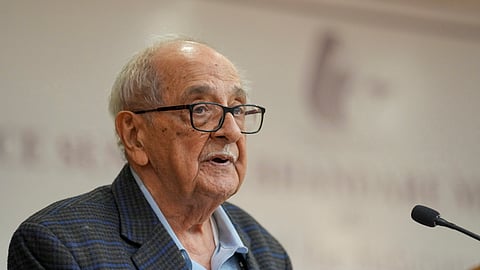

For the legal fraternity in India, the passing of Fali S Nariman on Wednesday marks the end of an era, an era dominated by titans like Soli Sorabjee, Anil Divan and Shanti Bhushan. It marks the end of an era when the leaders of the profession were known as much for their success inside the court as for the outspoken and courageous stands they took outside it.
“It is one thing to practice law, quite another to understand law, to apply law and to feel for the law. This was a generation that fell into the latter category,” says Aman Lekhi, Senior Supreme Court lawyer and a former Additional Solicitor General of India. “We have only pretenders today, those who pretend to be lawyers. These were the practitioners of law, and one by one, we have lost them.”
“For me,” says Arvind Datar, who has worked with Fali Nariman on several taxation related matters, “it is difficult to imagine the Supreme Court without him…that entire generation, most of them have now passed away – Soli Sorabjee, Shanti Bhushan, Anil Divan, and now Fali Nariman.”
More than a lawyer
Nariman was admired as much for his wit and knowledge as for the integrity of his character. Unlike the new generation of successful, jet-setting lawyers, Nariman was never afraid to ruffle feathers.
“It’s a breed that has almost become extinct,” says Lekhi. “It was a generation that had character – whether it’s Mr Nariman, whether it’s Shanti Bhushan, whether it’s my father [PN Lekhi]. They were a different breed, genius of a different kind.”
Admirers remember Nariman for how he stood up to those in power, whether in the judiciary or outside it. Senior lawyer and former minister Kapil Sibal remembers how he stepped down as additional solicitor general – a government lawyer – the day after emergency was declared in 1975.
“This one act symbolised what Fali stood for. He cherished the freedoms of his countrymen. Any attempt to suspend fundamental rights was anathema to Fali..He was not willing to be part of a government which attempted to muzzle our freedoms.”
Faizan Mustafa, legal scholar and former Vice-Chancellor of NALSAR University of Law, calls Fali Nariman “a bold dissenter and one of the last surviving moralists of our time”.
Fali Nariman, he pointed out, was not one who believed that silence was an option “when democracy, judicial independence, constitutional ethos and civil liberties are under threat”.
Fundamentally, Nariman was a constitutionalist – someone who believed in the primacy of the constitution, even above that of Parliament.
One of his earliest successes was in the IC Golaknath case in 1967, where the Supreme Court held that fundamental rights are beyond the amending powers of the Parliament. He is also recognized as the architect of the collegium system, which ensured greater autonomy to the judiciary by limiting the role of the executive in judges’ appointments.
Later in life, Nariman was agitated by what he saw as attempts to erode the very nature of the constitution, such as its secular nature. He was outspoken in his comments on the Gujarat riots, and later, on what he saw as the incursion of religion into the administrative politics of India’s most populous state.
Sibal, in this context, remembers the letter the Nariman wrote to him last week expressing his satisfaction at the Supreme Court striking down the electoral bonds scheme, holding it contrary to voters’ right to know the sources of funds for political parties.
The constitutionalist in Nariman could never bring himself to peace with draconian laws such as the Unlawful Activities (Prevention) Act, a law that makes it nearly impossible for those charged to obtain bail.
Little surprise, then, that the letter expressed the hope that “at some point in the future, the Supreme Court will strike down the ‘no-bail provision’ in recently enacted laws.”
Rajeev Dhawan, noted lawyer and human rights activists, ascribes Fali Nariman’s elevated sensitivity on these matters to his keen understanding of the pushes and pulls that shaped the Indian constitution.
“He fervently believed that the next generation must understand the constitution and how it developed…He is needed even more in a present troubled time of confronting the emerging elected dictatorship,” he noted in his tribute.
A time to take stock
The legal fraternity in India would do well, says Aman Lekhi, to treat the passing away of Nariman as an occasion to introspect and make corrections.
“I’ve seen the old go down, I’ve seen the new come up. I know the difference,” he says.
“Today, we measure a lawyer according to the number of appearances, according to his financial standing and worth. We measure a lawyer according to his ability to manipulate a bench..and this manipulation is achieved not by being resolute about a position, but being malleable and flexible so as not to offend, so as to ensure that whenever the lawyer appears next, the discretion that the judge has to exercise, is exercised favorably.
“What was unique about this generation of lawyers that is passing was that they were unconcerned about the consequences of their beliefs. Their commitment to the profession was so total that they pursued what they felt was right with complete dedication, which is totally absent today.
“I practice law very seriously…I am offended by the way junior lawyers ape the kind of lawyers they should not be aping. We have to be the right role models. These were the right role models…It’s time that we relook at ourselves, we have a relook at the profession, we have a relook at where we are going and what we are doing.”